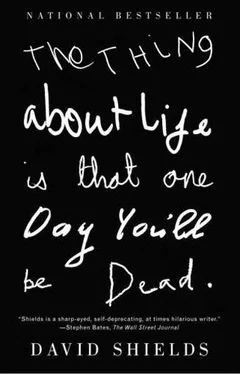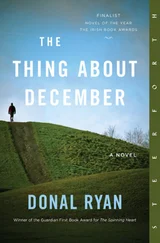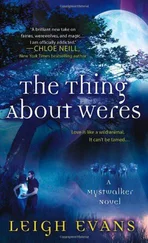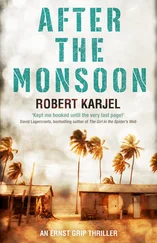Notes on the Local Swimming Hole
Swimming is by far the best tonic I’ve found yet for my back. I’m not a good swimmer—I do the breaststroke or elementary backstroke in the slow lane—but when I took a two-week break from swimming, I was surprised how much I missed it. When I returned to the pool, I realized it’s where I get, as Evelyn Ames says in Postcards from the Edge, “my endolphins.” I can hardly bear Sunday, when the pool is closed.
Outside the Green Lake Community Center are the healthy people—the gorgeous rollerbladers and runners and power walkers doing laps around a large lake in the middle of the city, the buff basketball players, the junior high baseball players, the yuppie Ultimate Frisbee players, the latte drinkers checking one another out, the Euro-cool soccer players, the volleyballers, the softball players. The indoor pool is the wetland of the maimed—home to those bearing canes, knee braces, neck braces—for who else would be free or motivated to be here at, say, 1:00 P.M. on Wednesday? I’m joined by people recovering from knee surgery, spinal surgery, car accidents; obese people who weigh themselves daily but never seem to lose a pound; a man in a wheelchair with his faithful dog barking at any potential interference; another wheelchair-bound man whose assistant is an almost cruelly cheerful Nordstrom shoe salesman; the Walrus Splasher (a huge guy with a handlebar moustache whom we’re all trying to build up the courage to approach about the tidal waves he sends our way as he pounds the water); and a pre-op transsexual from New Jersey who, day by day, is wearing more and more feminine attire and is sticking out his butt and chest with greater self-confidence. He’s the one who told me the locker room was closed one day owing to an outbreak of leprosy; it turned out to be just a homeless guy who had shat his pants. Nearly everyone here is trying to come back from something; you can feel it in the men’s locker room, where we don’t talk that much.
The good swimmers while away too much time talking; they’re not desperate, as the rest of us are, to claw their way back into shape by doing their assigned 36 laps (one mile). The good swimmers have an uncanny ability to skid across the top of the water, while the rest of us plunge down, down, down. The falling apart of our bodies; the perfection of youthful bodies; the pool is, for me, about one thing: the tug of time.
Every swimmer seems lost in his or her own water space (accidentally touching someone’s toe or shoulder always feels thrillingly, wrongly intimate). I’m never so aware of the human perplexity as when I’m at Green Lake with my fellow bodies. We’re all just trying to stay alive; we have no greater purpose than glimpsing a shadow of ourselves on the surface as we glide underwater. What is the point of floating? To keep floating. I feel the weightless, gorgeous quality of existence.
Until very recently, my father would swim at least 15 laps every day, diving headfirst rather than sashaying his way in, as I do. Now, though, he can hardly manage a stroke or two across the width of his condo’s pool without his arthritis forcing him to stop and clutch his leg. He’s always been addicted to terrible puns; now, he keeps playing with variations on the word “arthritis.” Arthur, write us. Author, write us. Author, right us. There’s no author, we both know, and there’s no way he can right us. Earlier this year, it was just the two of us alone in the pool. I was doing laps and flip turns—my back was feeling weirdly trouble-free for the moment—while he was tottering in the shallow end. After just a few minutes, he got out, toweled off, and headed over to the sauna, carrying the sports page.
As soon as animals, including humans, reach sexual maturity, many of their functions weaken. These weaknesses appear in humans beginning at age 25.
With the salmon and octopus and many other plants and animals, reproduction is, in effect, willful suicide. After reproduction, the body is a useless shell, so it’s discarded. The body is, for all intents and purposes, the host, and the reproductive system is the parasite that brings the body to its death.
As the biologist E. O. Wilson says, “In a Darwinian sense, the organism does not live for itself. Its primary function is not even to reproduce other organisms; it reproduces genes, and it serves as their temporary carrier. Samuel Butler’s famous aphorism, that the chicken is only an egg’s way of making another egg, has been modernized: the organism is only DNA’s way of making more DNA.”
Bats live longer than rats, but they reproduce more slowly. Birds live longer than ground-dwelling mammals, but flightless birds have short lives. Some turtles and tortoises live longer than humans. Organisms exposed to high risk invest little in maintenance and a lot in reproduction, whereas organisms exposed to low risk do the opposite.
Virgin male and female fruit flies live longer than fruit flies that reproduce. According to Luc Bussière, a zoologist at the University of Zurich, the best predictor of male crickets’ mating success is the quantity of time spent calling females. “We heightened this behavior by manipulating dietary intake,” he says. “For males on high-protein diets, it had the effect of promoting their promiscuity and reducing their longevity. They literally knocked themselves out trying to impress female crickets. For humans, this might seem counterproductive because we don’t want to die young. We want to live long lives. But for animals the goal isn’t living longer; it’s to reproduce.” The survival instinct and the reproductive instinct are opposed.
Women who live longer have, on average, lower levels of fertility. Childless men and women, though, don’t live longer than those who are mothers and fathers. You can’t choose not to have children and thereby gain extra years of life by redirecting your resources for reproduction into efforts at self-maintenance. Your genes make you disposable but have not left you the flexibility to choose to live a longer life by not propagating them. My father has frequently complained to me—without the least self-consciousness or irony—about what a toll it took on him to have to earn a living. “Let’s put it this way,” he once said. “I wanted a good life available on terms that did not offend. It hasn’t always worked out that way. There were jobs I wasn’t exactly crazy about, worked at them because there were bills to pay, a lot of financial obligations and responsibilities.”
In an experiment on white mice gender-segregated by an electric fence, the males backed off at the first severe shock whereas the females continued to charge the fence until each in turn was electrocuted.
A woman’s shapely hips are a sign of childbearing potential; fat deposits serve as an energy source during pregnancy. A few weeks after Natalie was born, I was walking home from the market, carrying diapers, baby food, etc. Noticing a young, attractive, glammed-up woman wearing a halter top and driving a red convertible, I viewed her in terms I would never have considered before: something approaching awed appreciation that she was doing all she could to perpetuate the species.
So many Hollywood movies are barely disguised procreation myths—getting the most fertile couple to come together. To take one among thousands of examples, in Otto Preminger’s film Laura, gossip columnist Waldo Lydecker lives in language and can’t engage life. Shelby Carpenter, a gigolo, is too dumb to have any grasp on life, expressing himself only through clichés. Homicide detective Mark McPherson knows what life’s about and so is able to maneuver through it successfully, despite its dangers and the inevitable conclusion (death). Lydecker winds up killing the wrong woman, then getting shot. Carpenter childishly submits to an older woman’s maternal embrace. McPherson and Laura, at movie’s end, are ready to breed.
Читать дальше












